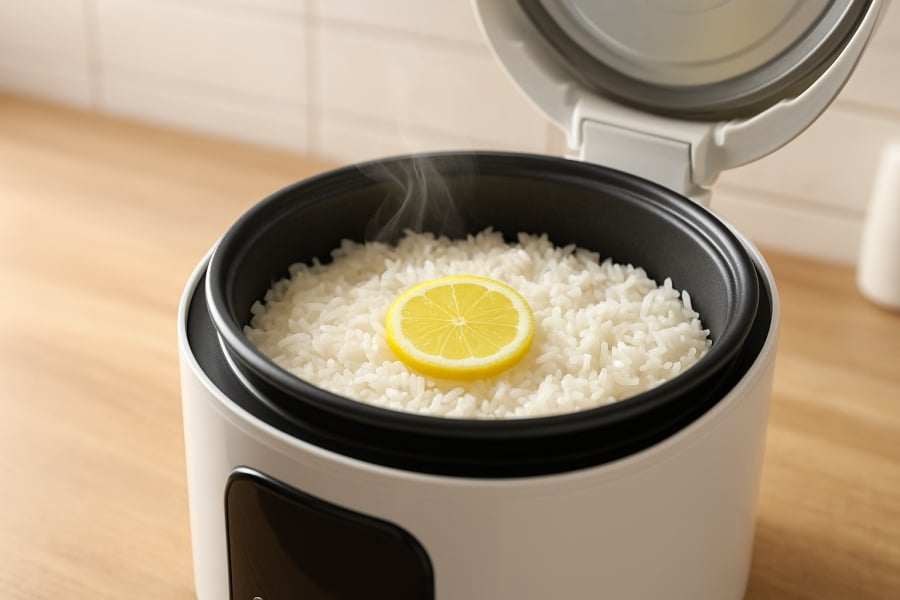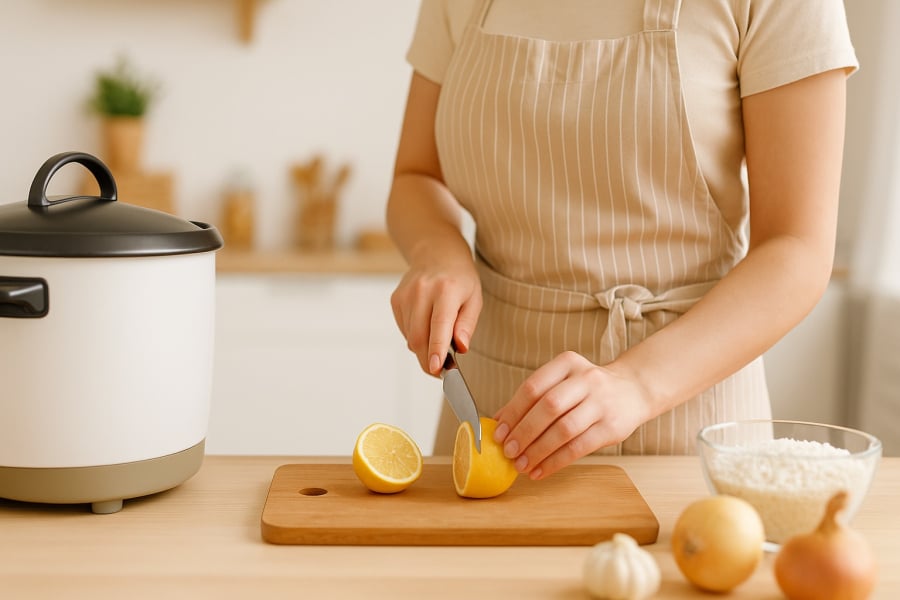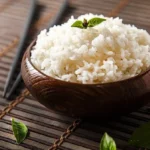Why Does Cooked Rice Spoil Easily?
In a high-temperature environment, cooked rice – mainly composed of starch and water – is prone to fermentation and spoilage by bacteria within a few hours if not properly stored. According to the Food Safety Authority (Ministry of Health), cooked food left at room temperature for more than 2 hours, especially in humid weather, is at risk of bacterial contamination and becomes unsafe to consume.
In reality, many households still practice cooking rice in large batches for multiple meals, especially in families with working adults and school-going children. Storing and reheating rice safely is a practical concern in daily life.
Adding Lemon to Rice – Traditional Wisdom or Scientific Fact?
The trick of adding a slice of lemon during rice cooking has been passed down in many Vietnamese families. Essentially, lemons contain citric acid, a natural acid that inhibits the growth of microorganisms.
Similarly, chefs in Japan and Korea use rice vinegar (containing acetic acid) in sushi rice for better preservation and to maintain its freshness. This suggests that using mild acids (from lemons or vinegar) in rice is scientifically valid.
As mentioned in an article by Dân Trí newspaper, to prevent rice from spoilage in hot and humid weather, homemakers can add a small amount of vinegar to the rice cooker at a ratio of 1.5 kg of rice to 2-3 ml of vinegar. If vinegar is unavailable, lemon can be used as an effective alternative.

Practical Effects: No Impact on Rice Flavor
Real-world tests in numerous households reveal that adding a thin slice of lemon or a few drops of lemon juice to the rice cooker does not significantly alter the flavor of the cooked rice. The rice retains its natural aroma, without a distinct lemon scent, and stays fresher for longer at room temperature for up to 6-8 hours.
Apart from preservation, lemon also contributes to a glossier and fluffier texture – an aesthetic and culinary improvement appreciated by many homemakers.
Precautions When Using This Tip
While the lemon trick aids in rice preservation, it cannot replace specialized storage methods such as refrigeration or the proper use of insulated containers.
- Avoid excessive use of lemon to prevent altering the taste of the rice.
- This method is suitable for short-term storage (less than 8 hours).
- Individuals with lemon allergies or those on an acid-restrictive diet should exercise caution.

Conclusion
Adding a slice of lemon during rice cooking is a handy tip that can effectively prolong the shelf life of cooked rice at room temperature. While it does not replace modern preservation methods, it aligns with the lifestyle and weather conditions in Vietnam. When applied appropriately, this trick reduces food waste and empowers homemakers to manage meals more flexibly.
The Showerhead is Dirtier Than a Toilet: Expert’s Guide to 5 Easy Cleaning Methods
For an efficient and thorough clean, it is recommended to disassemble the showerhead and clean each component individually. Ensure that all parts are completely dry before reassembling. This meticulous approach ensures that any built-up dirt or grime is effectively removed, maintaining optimal performance and water flow.
“Unlocking Radiant Skin and a Slimmer Figure with Familiar Kitchen Ingredients”
Many Vietnamese women overlook the power of natural, readily available ingredients in their kitchens that can work wonders for their skincare and weight management routines. This article will unveil the secrets to achieving a glowing, radiant complexion and a slender figure through simple, effective beauty rituals using these familiar ingredients.





































